Agrarian socialism is a political ideology that promotes social ownership of agrarian and agricultural production as opposed to private ownership. Agrarian socialism involves equally distributing agricultural land among collectivized peasant villages. Many agrarian socialist movements have tended to be rural, locally focused, and traditional. Governments and political parties seeking agrarian socialist policies have existed throughout the world, in regions including Europe, Asia, North America, Latin America, and Africa.
1917 Socialist–Revolutionary election poster: the caption in red reads партия соц-рев (in Russian), short for "Socialist Revolutionary Party." The banner bears the party's motto В борьбе обретешь ты право свое ("In struggle you take your rights"), and the globe bears the slogan земля и воля ("land and freedom"); they express the party's agrarian socialist ideology.
Agrarianism is a social and political philosophy that promotes subsistence agriculture, family farming, widespread property ownership, and political decentralization. Adherents of agrarianism tend to value traditional bonds of local community over urban modernity. Agrarian political parties sometimes aim to support the rights and sustainability of small farmers and poor peasants against the wealthy in society.
François Quesnay, a physician who is considered the founding father of physiocracy, published the "Tableau économique" (Economic Table) in 1758
Pierre Samuel du Pont de Nemours, a prominent physiocrat. In his book La Physiocratie, du Pont advocated low tariffs and free trade.
Thomas Jefferson and his supporters idealised farmers as the citizens that the American Republic should be formed around.
Emiliano Zapata fought in the Mexican Revolution in the name of the Mexican peasants and sought to introduce reforms such as land redistribution.





